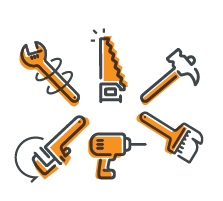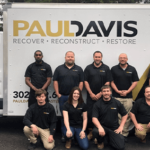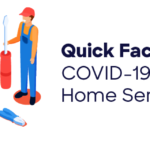
They say some lessons can be learned only through experience. But you can skip ahead with these tips from Angi Leads (formerly HomeAdvisor) pros who’ve seen it all!
16 Pieces of Advice From Top Contractors
Do you ever wish you could go back in time and tell your former self all of the life lessons you’ve learned so far? As a business owner or contractor, you might even wonder where you’d be today if you could just go back and change one thing. No matter where you are in your career or business, a little wisdom from pros who have been there can go a long way. So, we asked some of our most highly-rated pros, “What do you wish you’d known when you first started out?”

1 Finding trained employees is a major challenge.
“I wish I would have known how difficult it is to find trained employees in the field we work in,” says Reid Gravitte, owner of After Hours Home Improvement in Springfield, Va. He couldn’t find qualified employees and had to problem-solve. His solution was to offer paid training to his staff after hours, and to bring in trade experts who could help them strengthen various skillsets. He found that investing in his employees was just as much an investment in the success of his business.
Learn more: How to Outsmart the Labor Shortage

2 An industry mentor can be invaluable.
“When you get into any business, it’s good to have somebody that’s been in the business for 10 years or more to bounce ideas off of,” Gravitte says. With a mentor, you can get insights into processes that you could only learn through experience otherwise.
“I wish I’d known how big projects work as far as the permitting process. Nobody teaches you that. Knowing when you have to pull a permit, knowing what inspections you’re going to have to have. You kind of have to learn that on the fly.”

3 Running a business means pushing lots of papers.
“One of the biggest problems you run into is that the more your company grows, the more you’re pulled away from doing the work you started out doing,” says Michael Bogucki, owner of E5 Contracting Services LLC in Buffalo, N.Y.
“You’re going to be an accountant, a bookkeeper, a secretary. Everything is going to seem incredibly difficult. Give it six months and you’ll be an expert. It becomes second nature. Don’t get overwhelmed – and get help wherever you can. A lot of times, it’s simply a matter of getting an accountant.”
4 A database is worth the tedious upkeep.
For Elizabeth Loesch, owner of AtlantaBlue Pressurewash Company in Atlanta, Ga., a well-managed database process would’ve helped a lot. “Stay on top of your database,” she says. “Make sure your customers remember who you are, so that — when it comes time a year or two or three later — they remember you and can find you. That is one thing I wished I had done a better job with.”

5 Lead generation is key to staying busy.
“The best thing I could’ve known would’ve been lead generation,” says Andre Knight, owner of Good Hands Handyman in Atlanta, Ga. When he started out, the yellow pages were still the go-to place to find home service professionals, and internet search results were dominated by the companies with the most money. “If I would’ve known how well lead generation would work, I would’ve been so much more ahead of the game,” he says. “Our sales definitely would have tripled, and we would’ve stayed more busy. We like what HomeAdvisor is doing. It’s more like the contractor that does the best work now gets the most work.”
Bogucki and Gravitte concur. “HomeAdvisor helps bridge that gap between working for yourself and other people and trying to get enough business to keep yourself employed,” Bogucki says. “As soon as I was able to get on HomeAdvisor, it really helped fill out my schedule.”
“I’m lucky because, without HomeAdvisor, I don’t know how we would’ve gotten ourselves into the 21st century and been this successful,” Gravitte says. “It was such a huge advantage.”
Learn more: 5 Angi Leads (formerly HomeAdvisor Pro) Perks You Could Be Missing out On

6 Outsourcing can have tremendous returns.
“You don’t want to be wearing all of the hats,” Loesch says. “The owner, the person who procures materials, the person who quotes, who sells and does all of the administrative work, the person who’s a technician. You have to be able to employ people.”
If you do find yourself wearing all of the hats, take Bogucki’s earlier advice and find help where you can. Outsourcing can streamline your processes and even save you money. For example, Bogucki didn’t realize he could deduct his mileage until he hired an accountant. “I didn’t even know what a mileage log was,” he says. “And I lost a lot of deductions because of that. Now, I have an app called MileIQ on my phone and every drive I take within business hours is automatically tracked as a business expense. And I just email the spreadsheet to my accountant.”
7 Owning your weaknesses is a strength.
“There’s nothing wrong with saying, ‘I don’t know something,’” Gravitte says. “If you don’t admit it and you try to fly by the seat of your pants, it’s not going to do you any good. You have to understand your weaknesses and shine a light on them.” One of Gravitte’s weaknesses was hands-on knowledge of HVAC work, for example. So, he hired an HVAC expert to help him learn and improve his own skillset.

8 In order to grow, you have to let go.
Gravitte, a self-confessed micromanager, had been following up after his crew and obsessing over perfection for years. Then, he read the personal development book The Master Key System (Charles F. Haanel), which encouraged him to envision his goals. He envisioned his company growing – and knew he had to let go. “There comes a point where you have to trust that your people have it and they’re going to do it the way you want it. It’s hard, but you have to let go and let your people grow. I wish I did this 12 years ago. We would have gotten to where we are now a bit quicker.”
Learn more: 7 Simple Tips for Scaling Your Home Services Business
9 Some equipment is worth the investment.
“You want to have the best, top-of-the-line tools,” says Knight. “It makes your job a lot easier and faster, and it makes for the best quality.” Bogucki agrees: “When you’re starting out, say you want to buy a tile saw and there’s a $200 tile saw and an $800 tile saw, go buy that $800 tile saw. It’s going to last you 10 times longer, operate better and give you better performance. Invest in the tools you need to do the job well. Half the time what sets a professional and an amateur apart is the tool.”

10 Some equipment isn’t worth the investment.
Where tools are always a solid investment, there is excessive equipment you might want to avoid to start. “A lot of people want big fancy rigs,” says Loesch. “I sold my rig. I didn’t need it. Everything I need is in the back of my truck. I’m not in debt, I don’t have big payments, and I can produce all of my residential and small commercial jobs. Knowing what you’re doing is a lot more important than the image of big equipment.”
11 Some jobs won’t make sense for you – or the client.
As a handyman, Knight has learned to be honest with himself – and the client – if he can tell that a job won’t work out from the start. For example, if a window or door is too damaged to repair, he’ll advise a replacement or specialty services. “Just because they want you to do it doesn’t mean you should do it,” he says. “I try to be honest and tell them, ‘I can do it, but it’s not going to make a difference.’”

12 It’s okay to walk away from an impossible situation.
Bogucki had to learn to walk away from situations where he felt disrespected or undervalued. “One big mistake I made was allowing the homeowner to be in the driver’s seat,” he says. “When you’re starting out you really want to go after this work, but there’s people you shouldn’t work for. Don’t let people get under your skin and don’t be afraid to look out for yourself.”
13 Branding yourself is as important as skill.
“You have the talent and skill,” Knight says. “You need to know how to market yourself. In the beginning, I didn’t uniform myself, but now I have big moving trucks with my logo on them. It’s important to look like a handyman. I put ‘HANDYMAN’ on my shirt in the biggest letters I could get. That stands out, even just going to Home Depot.” Knight’s branded uniform and truck help him stand out, and they also reassure his clients that they’re working with a professional.
Learn More: Pro Tips to Fine-Tune Your Profile and Build Brand Recognition

14 An online presence is essential.
“You need to have an online presence,” Bogucki says. “When people are looking for a contractor, they want to beep-bop around and look at pictures – and they do that online.” Of course, as Bogucki has learned, it’s wise to base the extent of your marketing efforts on how established your business is. If you’re just starting out, for example, you may not want to commit to a contract with a search engine optimization (SEO) company just yet. “You may be better off sticking to something like HomeAdvisor right from the get-go that sets you up basically for free, and spending time putting up pictures, following up leads and really creating presence for yourself,” he says.
Learn more: 6 Ways to Build a Better Marketing Plan
15 Leveraging technology can improve lead quality.
“You want to use the phone,” Knight says. “If a homeowner says they want a room painted or drywall repaired, we ask them to take a picture and send it to us – a drywall repair especially. How big is the hole? If they can’t describe it, they can take a picture. Then they text us the picture.” With these photos, Knight is better able to assess jobs and prepare quotes.

16 Put everything in writing.
Knight’s experiences have taught him that, no matter the job, you have to put everything in writing – down to details like how many coats of paint are included and who is responsible for moving furniture. “You always want to be professional,” Knight says. “Favors can hurt you sometimes, so you always want to keep it in writing and cover yourself. Write everything out before everything starts.”
*Angi Leads is formerly HomeAdvisor Pro
Stay Up to Date on Trends
Get the latest marketing & business tips in your inbox.










